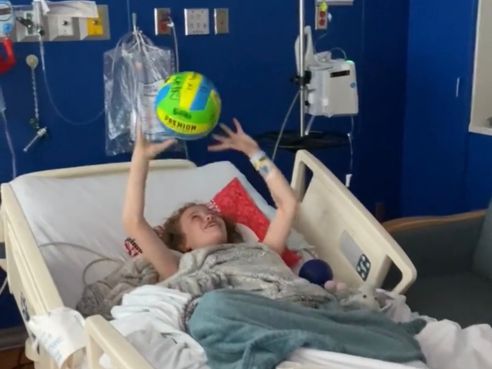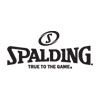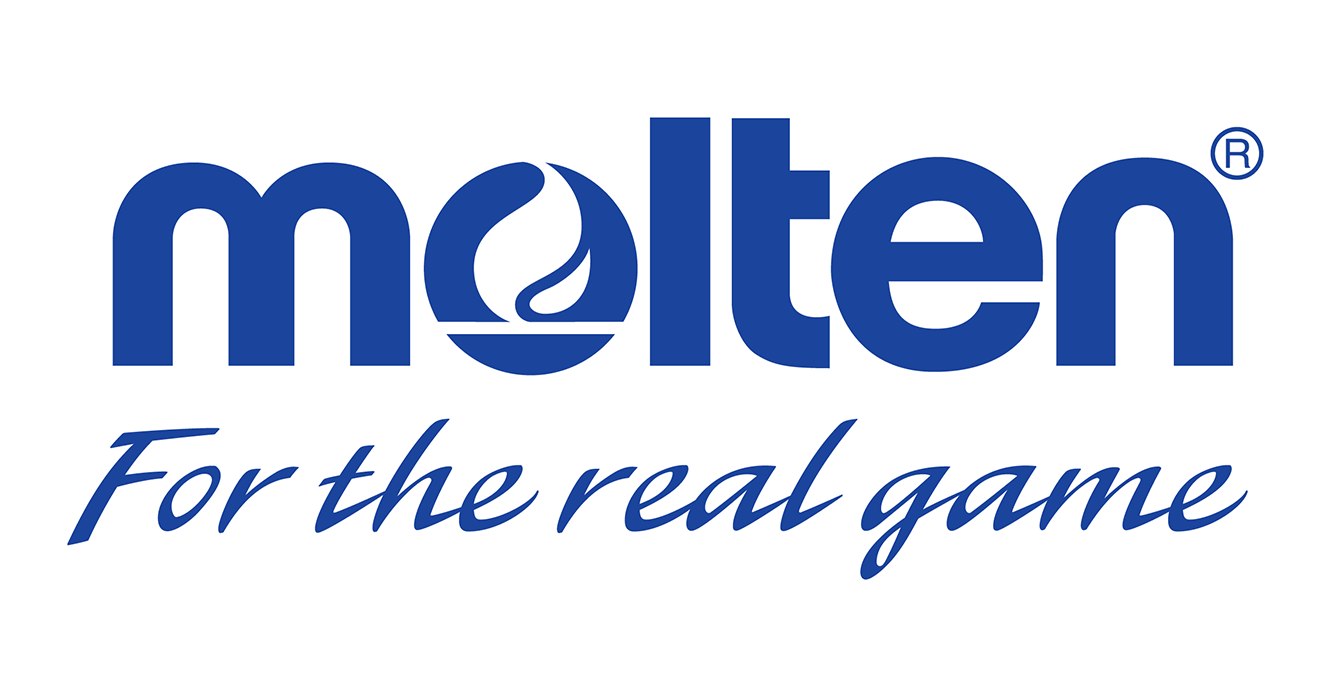Beyond the Court: These Two Teens Didn't Let a Rare Disorder Stop Them from Playing Volleyball
06/30/2023
Guillain-Barre syndrome is a rare disorder in which your body's immune system attacks your nerves. (Pictured: Karoline Zabilowicz)
By Jane Huber
ORLANDO, Fla. (June 30, 2023) -- A lot of people will tell you that sports built their character or got them through a rough time, but for Mackenzie Ryan and Karoline Zabilowicz, volleyball played a role in saving their lives.
Zabilowicz, a Tampa, Florida native, was playing a volleyball match in March of 2021 when she fell and suffered what those in attendance assumed to be a severe concussion.
“Her balance was off, way more than it should have been,” said Karoline’s mother, Jeanmarie Zabilowicz.
Karoline hit the ground with such force that she was knocked unconscious, and shuttled to the local hospital in an ambulance – where she found out there was more going on than met the eye.
(1).jpg)
Above: Karoline playing during the 50th AAU Junior National Volleyball Championships
Similarly, Mackenzie was also made aware of her symptoms during a match in August 2022, uncharacteristically missing her serve and feeling as though she couldn’t run or jump for balls. She told her doctors she felt as though her feet were always asleep.
Makenzie, a player for the St. Pete Storm out of St. Petersburg, Florida, was told her symptoms were residual pain from a scoliosis surgery the previous year. Three days later, she returned to the hospital with Bell’s palsy, a form of facial paralysis, and such severe pain she was unable to sit or lay down.
.jpg)
Above: Mackenzie's volleyball portrait
Seventeen months apart, having both experienced bouts of paralysis, each girl underwent a spinal tap to confirm their eventual diagnosis, the rare Guillain-Barre syndrome (GBS).
“I dropped to my knees at that point, because no one could say whether she would make it through the night,” Mark Zabilowicz, Karoline’s father, recalled.
Inexplicably, both girls were diagnosed with Guillain-Barre syndrome as teenagers, despite the disorder more commonly afflicting older adults and males. As Karoline’s mom explained, “it involves the immune system attacking the nervous system.” There is currently no known cure for GBS, only treatments to alleviate symptoms and shorten their duration.
GBS is an ascending disorder, beginning in the feet and ankles and working up the body. It is crucial to treat before it gets to the lungs and can impact a person’s breathing. Thankfully for Karoline and Mackenzie, the symptoms they experienced while playing helped doctors realize more quickly what was wrong.
However, receiving a diagnosis was only the first hurdle, as each girl spent more than two months in and out of various intensive treatment programs.
For Mackenzie, her worst GBS symptoms arose in the midst of Hurricane Ian, and she was discharged from the hospital only to return a week later. She was told that she would be lucky to return to school the next year able to walk, and that she would never be able to play volleyball again.
Regardless of their condition, the girls refused to accept a world without volleyball as their reality.
Karoline’s prized possession in the hospital was a volleyball her teammates signed, and she would set to herself over, and over, and over again. During her outpatient rehabilitation, Mackenzie asked her physical therapist to play kneeling volleyball, keeping her hands sharp while she learned to walk again after a period of paralysis.
The sport also gave each girl an invaluable sense of community.
Often times, Mackenzie would be unable to see her family as they continued working and taking care of her younger brother. She credits her volleyball family with filling in the gaps during those hard days. She received surprise visits from coaches, club directors, teammates from years ago, and even teammates she hadn’t yet played with.
“It meant so much that they came all the way there to see me,” Mackenzie said.
Karoline’s teammates showered her with gifts, and her mom said they received tremendous support from the other families on her team.
“It was nice to have people with me who knew what I had been through,” Karoline reflected.
Karoline’s team, Tampa North 14 Black, recently took the court during the first session of the 50th AAU Junior National Volleyball Championships. One of the primary reasons Karoline joined Tampa North was to be able to play in an AAU tournament. She was unsure she would be able to attend after a GBS flare-up in May left her and her doctors shocked, but Karoline and her family aren’t taking the experience for granted.
“Nationals has been fun, it’s definitely an overwhelming experience, but it’s really fun,” Karoline said.
While she says she was initially hesitant to play again, she’s now the first person you’ll see running into a wall or diving on the ground for a ball. She is known for being intense and self-disciplined on and off the court, but her parents see every minute as a blessing.
Her father, Mark Zabilowicz, became emotional contemplating his daughter’s experience.
“It makes you think. It gives you perspective on life. What you have now can be taken away in the snap of a finger,” he said.
Karoline hopes to one day win AAU Nationals with her team and eventually play volleyball in college. Her mother credits the sport with helping Karoline develop into the person she is today, “not only as an athlete but as a wonderful teenager.”
Mackenzie is working towards graduating high school and has developed an interest in pediatric nursing after spending so much time around nurses during her hospital stay.
Her advice to other players facing adversity?
“Keep pushing. It’s never easy. People might tell you that you’re done, but you’re not. Just keep going and fight for what you want to fight for, and it will be worth it in the end.”
ORLANDO, Fla. (June 30, 2023) -- A lot of people will tell you that sports built their character or got them through a rough time, but for Mackenzie Ryan and Karoline Zabilowicz, volleyball played a role in saving their lives.
Zabilowicz, a Tampa, Florida native, was playing a volleyball match in March of 2021 when she fell and suffered what those in attendance assumed to be a severe concussion.
“Her balance was off, way more than it should have been,” said Karoline’s mother, Jeanmarie Zabilowicz.
Karoline hit the ground with such force that she was knocked unconscious, and shuttled to the local hospital in an ambulance – where she found out there was more going on than met the eye.
(1).jpg)
Above: Karoline playing during the 50th AAU Junior National Volleyball Championships
Similarly, Mackenzie was also made aware of her symptoms during a match in August 2022, uncharacteristically missing her serve and feeling as though she couldn’t run or jump for balls. She told her doctors she felt as though her feet were always asleep.
Makenzie, a player for the St. Pete Storm out of St. Petersburg, Florida, was told her symptoms were residual pain from a scoliosis surgery the previous year. Three days later, she returned to the hospital with Bell’s palsy, a form of facial paralysis, and such severe pain she was unable to sit or lay down.
.jpg)
Above: Mackenzie's volleyball portrait
Seventeen months apart, having both experienced bouts of paralysis, each girl underwent a spinal tap to confirm their eventual diagnosis, the rare Guillain-Barre syndrome (GBS).
“I dropped to my knees at that point, because no one could say whether she would make it through the night,” Mark Zabilowicz, Karoline’s father, recalled.
Inexplicably, both girls were diagnosed with Guillain-Barre syndrome as teenagers, despite the disorder more commonly afflicting older adults and males. As Karoline’s mom explained, “it involves the immune system attacking the nervous system.” There is currently no known cure for GBS, only treatments to alleviate symptoms and shorten their duration.
GBS is an ascending disorder, beginning in the feet and ankles and working up the body. It is crucial to treat before it gets to the lungs and can impact a person’s breathing. Thankfully for Karoline and Mackenzie, the symptoms they experienced while playing helped doctors realize more quickly what was wrong.
However, receiving a diagnosis was only the first hurdle, as each girl spent more than two months in and out of various intensive treatment programs.
For Mackenzie, her worst GBS symptoms arose in the midst of Hurricane Ian, and she was discharged from the hospital only to return a week later. She was told that she would be lucky to return to school the next year able to walk, and that she would never be able to play volleyball again.
Regardless of their condition, the girls refused to accept a world without volleyball as their reality.
Karoline’s prized possession in the hospital was a volleyball her teammates signed, and she would set to herself over, and over, and over again. During her outpatient rehabilitation, Mackenzie asked her physical therapist to play kneeling volleyball, keeping her hands sharp while she learned to walk again after a period of paralysis.
The sport also gave each girl an invaluable sense of community.
Often times, Mackenzie would be unable to see her family as they continued working and taking care of her younger brother. She credits her volleyball family with filling in the gaps during those hard days. She received surprise visits from coaches, club directors, teammates from years ago, and even teammates she hadn’t yet played with.
“It meant so much that they came all the way there to see me,” Mackenzie said.
Karoline’s teammates showered her with gifts, and her mom said they received tremendous support from the other families on her team.
“It was nice to have people with me who knew what I had been through,” Karoline reflected.
Karoline’s team, Tampa North 14 Black, recently took the court during the first session of the 50th AAU Junior National Volleyball Championships. One of the primary reasons Karoline joined Tampa North was to be able to play in an AAU tournament. She was unsure she would be able to attend after a GBS flare-up in May left her and her doctors shocked, but Karoline and her family aren’t taking the experience for granted.
“Nationals has been fun, it’s definitely an overwhelming experience, but it’s really fun,” Karoline said.
While she says she was initially hesitant to play again, she’s now the first person you’ll see running into a wall or diving on the ground for a ball. She is known for being intense and self-disciplined on and off the court, but her parents see every minute as a blessing.
Her father, Mark Zabilowicz, became emotional contemplating his daughter’s experience.
“It makes you think. It gives you perspective on life. What you have now can be taken away in the snap of a finger,” he said.
Karoline hopes to one day win AAU Nationals with her team and eventually play volleyball in college. Her mother credits the sport with helping Karoline develop into the person she is today, “not only as an athlete but as a wonderful teenager.”
Mackenzie is working towards graduating high school and has developed an interest in pediatric nursing after spending so much time around nurses during her hospital stay.
Her advice to other players facing adversity?
“Keep pushing. It’s never easy. People might tell you that you’re done, but you’re not. Just keep going and fight for what you want to fight for, and it will be worth it in the end.”
 Email
Email Print
Print









